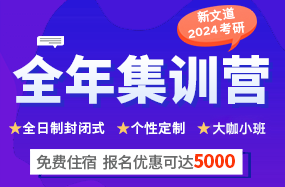***2020考研每日一句來(lái)了,這是***老師第8年的堅(jiān)持,從元宵節(jié)開始一直到考前,跟著***老師一起堅(jiān)持學(xué)習(xí)起來(lái),下面是湖北新文道考研小編為大家整理的***每日一句第70句!
今天的句子:
Balancing the benefits more humanlike AI could bring with the risk for abuse is a tortured task from a practical point of view. From a more human one, however, it can be hard not to hope the tide of technological change will roll in slowly. Those hidden meanings, mystifying relationships and even groan-worthy puns that stump machines are what make Shakespeare Shakespeare. They’re also what make us us.
(想想你會(huì)怎么出題?)
What can we learn from the passage?
(A) Humanlike AI could bring more benefits than risk for abuse from a practical point of view.
(B) People are prone to anticipate the slow tide of technological change in the changing times.
(C) Machines make Shakespeare stumped for the mystifying relationships and the puns.
(D) Balancing the benefits and the risk to prevent the tortured task is a practical point of view.

參考譯文:從實(shí)踐的角度看,平衡類人AI可能帶來(lái)的好處和濫用風(fēng)險(xiǎn)是一項(xiàng)折磨人的任務(wù)。

參考譯文: 然而從人性的角度看,很難不希望技術(shù)變革的浪潮緩慢向前。

參考譯文:正是那些難倒機(jī)器的隱藏含義、神秘關(guān)聯(lián)、甚至是讓人痛苦呻吟的雙關(guān)語(yǔ)讓莎士比亞成為莎士比亞。
第四句:
They’re also what make us us.
參考譯文:也正是它們讓人成為人(我們成為我們)。
所以答案選B
文章背景和來(lái)源:
哈佛大學(xué)研究人員研發(fā)了一款軟件去分析莎士比亞的文章。
但是效果并不理想,很多文字,這款智能軟件依然會(huì)理解錯(cuò)誤。
這真的就是喜憂參半了。

推薦閱讀:***2020考研英語(yǔ)每日一句匯總
本文素材來(lái)源于網(wǎng)絡(luò),由武漢新文道考研進(jìn)行整理,想了解更多關(guān)于考研相關(guān)資訊,敬請(qǐng)關(guān)注新文道考研,我們將為同學(xué)們奉上全面完整的時(shí)下考研相關(guān)資訊。














 關(guān)注武漢新文道微信
關(guān)注武漢新文道微信